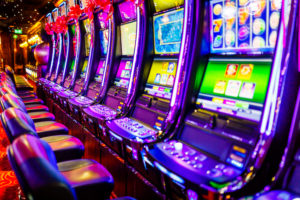Anti-gambling initiative targets CALD communities

A new initiative to reduce the harm problem gambling can cause in culturally and linguistically diverse communities has been announced by the Victorian Government.
Culturally and linguistically diverse (CALD) community organisations are being encouraged to to apply for funding from a new $200,000 grants program to help prevent or reduce gambling harm.
Grants of up to $20,000 are available to grassroots CALD organisations for projects that offer assistance in combating problem gambling in these communities.
Minister for Gaming and Liquor Regulation Marlene Kairouz announced the funding at a joint Victorian Responsible Gambling Foundation–Multicultural Centre for Women’s Health (MCWH) forum in Melbourne.
The event brought together established CALD community organisations to share their experiences and strategies for managing gambling harm.
Responsible Gambling Awareness Week (23-29 October) is a partnership between the Victorian Responsible Gambling Foundation, industry, community groups and local councils that aims to reduce gambling harm.
Tips that are being promoted throughout the week include: setting money and time limits and sticking to them; keeping track of spending; taking regular breaks; and, when catching up with friends, making sure it’s not always about gambling
For more information about Responsible Gambling Awareness Week, visit wellplayed.vic.gov.au.
Minister Kairouz said people from from culturally and linguistically diverse communities were more likely to experience harm from gambling.
“Having a gambling addiction can be very isolating, particularly if you are a member of a CALD community – this funding will go towards programs that will bring down the barriers to getting help,” she said.
MCWH Executive Director Dr Adele Murdolo it was important for community members to be able to recognise the signs of problem gambling.
“We hope that CALD communities and people who work with them will learn about the signs of gambling harm and some important tips to reduce harm from gambling,” she said.
In 2014 a study found refugees and migrants with poor language skills were at risk of becoming problem poker machine gamblers.
And the poorest suburbs are the areas where the lion’s share of money is lost on poker machines, gaming statistics show.
And it is these same suburbs where many refugees or new migrants settle because they offer affordable rental housing.
In Melbourne, among the highest pokies losses recorded were those in the local government areas of Brimbank and Dandenong, with more than $48.1 million and $38.8 million lost respectively for the 2012-13 financial year. Both areas have large numbers of refugees, asylum seekers or new migrants.
The Whittlesea and Wyndham areas are also home to significant numbers of refugees and migrants and also have relatively high pokies loss rates with $32.7 million and $32.1 million respectively.
Victorians poured more than $3 billion into the state’s 26,000 poker machines last financial year – or about $300,000 every hour.
A recent Victorian Competition and Efficiency Commission report said there were 30,000 problem gamblers in Victoria. Economic and social costs of the issue were estimated in the report at around $2.8 billion with the State Government set to reap just $1.25 billion in taxes from pubs and clubs.
Staff at settlement agency AMES Australia have, anecdotally, reported several instances of clients falling into debt after gambling on poker machines.
In one case, a refugee client from Afghanistan won $12,000 in a single session at a pokies venue. The man is now $4,000 in debt to friends because of subsequent losses.
Research by Dr Charles Livingstone of Monash University’s School of Public Health and Preventative Medicine said poker machines were disproportionately located in disadvantaged areas.
“If you have poker machines in areas of disadvantage, people will use them. The industry is aware that disadvantaged areas are more lucrative and they have located machines in these areas since they were first introduced in the 1990s,” Dr Livingstone said.
Anti-poker machines campaigner Paul Bendat says it’s easy to see why asylum seekers, who may be socially dislocated and who may have little to occupy themselves with, would be attracted to pokies venues.
“For someone from a culture where there is little or no gaming, it might be intriguing to visit a pokies venue,” he said.
“Provided you had a little money to spend, you could see how easy it would be to fall into the trap of trying to win some more,” Mr Bendat said.
For more information about Responsible Gambling Awareness Week, visit: wellplayed.vic.gov.au
Laurie Nowell
AMES Australia Senior Journalist












